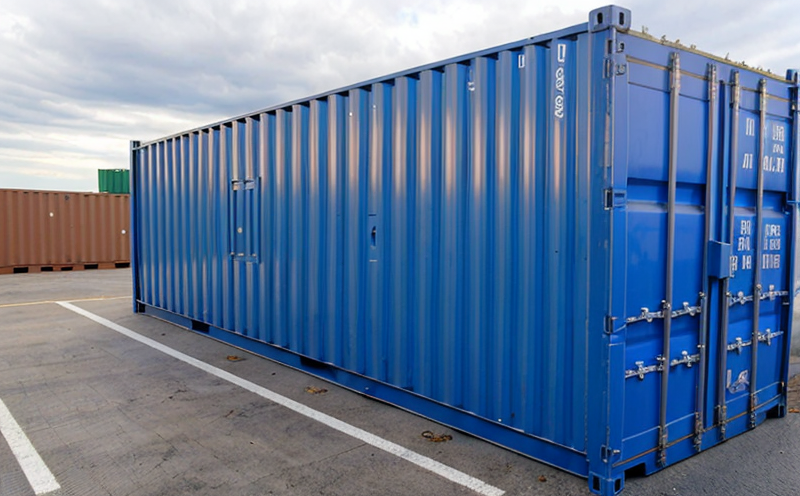ASTM F88 Seal Strength Testing of Plastic Storage Plastics
The ASTM F88 standard is a critical tool in the quality assurance and compliance processes for manufacturers of plastic storage containers. This test method evaluates the seal strength of plastic containers used to hold, store, or transport substances such as food, beverages, pharmaceuticals, and chemicals.
Seal integrity is paramount in ensuring product safety and maintaining the intended functionality of the container. ASTM F88 provides a standardized approach to determining the peel strength of the seal between the cap and body of plastic containers. This ensures that manufacturers can consistently meet regulatory requirements and quality standards, thereby protecting consumers from potential leaks or contamination.
The test is typically conducted using a tensile testing machine equipped with appropriate fixtures capable of applying controlled peel forces to the seal area. Specimens are prepared by cutting sections of the container along the seam where the cap meets the body. The test involves measuring the force required to separate these two parts, which indicates the strength of the bond.
The results from ASTM F88 testing play a crucial role in product development and quality control processes. For instance, manufacturers can use this data to optimize their design parameters for seal strength, ensuring that containers meet or exceed regulatory requirements such as those outlined by FDA (Food and Drug Administration) and EU regulations.
Understanding the implications of ASTM F88 testing is essential not only for compliance but also for enhancing product reliability. By adhering to this standard, companies can demonstrate their commitment to maintaining high-quality standards, which fosters trust among consumers and regulatory bodies alike.
Scope and Methodology
The ASTM F88 standard specifies the procedure for determining the peel strength of seals on plastic containers. The method is applicable to various types of plastic materials commonly used in packaging, including polyethylene (PE), polypropylene (PP), polyvinyl chloride (PVC), and polystyrene (PS).
The testing process begins with specimen preparation, which involves cutting specimens from the container along the seal line. Specimens should be cut to a specific size and shape as defined in the standard to ensure accurate measurement of peel strength.
Once prepared, the specimens are mounted onto a tensile testing machine equipped with an appropriate fixture that allows for controlled application of peel force. The test is conducted by gradually increasing the peel force until the seal separates. Care must be taken during this process to maintain consistent speed and load application rate to achieve reliable results.
The resulting data from ASTM F88 tests includes both peak peel strength values and average peel strength values, which are reported in units of pounds per square inch (psi) or newtons per square meter (N/m²). These metrics provide valuable insights into the overall quality and performance of the container seals.
| Parameter | Description |
|---|---|
| Test Specimen Size | Defined by the standard, typically 25.4 mm (1 inch) in length and 6.35 mm (0.25 inches) wide. |
| Peeled Edge Length | The distance over which peel force is applied; usually set at 25.4 mm (1 inch). |
| Test Speed | The rate at which the peel force is applied, generally between 30° and 90° per minute. |
The data obtained from ASTM F88 testing serves multiple purposes. It helps quality assurance teams identify potential weaknesses in container design or manufacturing processes that could lead to leaks or failures. Additionally, it supports ongoing efforts to improve product performance and meet stringent regulatory standards.
Industry Applications
- Pharmaceutical Industry: Ensuring drug stability within sealed containers.
- Beverage Industry: Maintaining the freshness and integrity of packaged beverages.
- Food Packaging: Protecting perishable foods from contamination and spoilage.
- Chemical Storage: Safeguarding hazardous materials from leaking into the environment or causing accidents.
- Biohazard Waste Management: Preventing leaks that could lead to biohazardous material release.
International Acceptance and Recognition
The ASTM F88 standard is widely recognized across the globe, particularly in North America and Europe. Many countries have adopted it as a national standard or incorporated its provisions into their own regulations.
- United States: ASTM F88 is frequently referenced by the FDA for ensuring container integrity.
- European Union: While not directly adopted, the principles of ASTM F88 influence EU directives on packaging safety.
- Australia/New Zealand: The Australian New Zealand Standards (AS/NZS) may reference ASTM F88 for similar applications.
- Canada: The Canadian Food Inspection Agency considers ASTM F88 when evaluating container seals.





